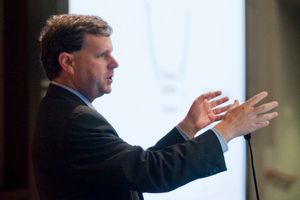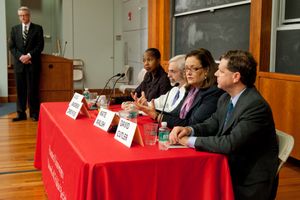Your Money or Your Life? Bicknell lecturer: health reform must focus on better, not just cheaper, care
The typical American nurse spends one-third of her day focused not on patient care but on documentation, such as taking computer data and printing it out, only to reenter it in another computer. Only 3 percent of physicians contact their patients by email, “which is smaller than the number of priests who email their parishioners,” according to Harvard economist David Cutler. Those were among the many medical inefficiencies Cutler cited Friday in the School of Public Health’s 11th annual Bicknell Lecture, Controlling Health Care Costs: Your Money or Your Life?

It will take 10 to 15 years to rid the health care system of those inefficiencies said Cutler, a member of President Clinton’s Council of Economic Advisers, who also advised Barack Obama’s presidential campaign. He argued that reorganizing the delivery of care is essential for better and cheaper health care. And it’s coming, like it or not, Cutler predicted, as federal and state governments find themselves drowning in deficits fed by medical price inflation.
“American health care is inefficient in a way that is both lower-quality and higher-cost than it needs to be,” he stated.
Cutler’s bottom line: the health care reform legislation signed by President Obama in March will spur the creation of accountable care organizations (ACOs). Another entry in medicine’s alphabet soup of acronyms, ACOs are networks of doctors and other caregivers who work together to better coordinate patient care, from start to finish. The idea is that greater efficiency weeds out unnecessary costs.
ACOs are a new idea, and they are evolving at present. The reform law authorizes Medicare, the federal health insurance program for senior citizens, to use ACOs for its patients. Given Medicare’s vastness (45 million seniors covered), the idea is that if the massive program improves care and efficiency with ACOs, private insurers will follow suit.
Cutler acknowledged “open questions” about exactly how ACOs will work and said that the country will need to experiment with the new system. But the geniuses who crack that nut, he predicted, will become rich.
Following the lecture, a three-person panel discussed whether Cutler’s forecast was on the mark.

“He’s right, but I don’t think we have as much time as he suggested,” said Andrew Dreyfus, president and CEO of Blue Cross Blue Shield of Massachusetts, which Cutler said is the rare insurer experimenting with better ways to coordinate care. “I don’t think we have 10 years. Maybe two to four years. Health care is breaking everybody’s budget.”
Kate Walsh, president and CEO of Boston Medical Center, said that contrary to conventional wisdom, so-called safety-net hospitals like BMC, which serve large numbers of low-income and uninsured patients, are well-positioned to become ACOs.
The reform law, which will insure 32 million previously uninsured Americans, will boost paying business to safety-net hospitals, she said. But she warned that possible cuts to hospital payments by Medicare and Medicaid, the federal-state health program for the poor, are a threat to those hospitals’ finances. There may also be cuts under the reform law in Medicare’s DSH payments, which are made by the federal government to hospitals caring for unusually large numbers of uninsured people, Walsh said.
Physicians must play their part in reform by becoming aware of research about which treatments are unnecessary and needlessly run up costs, said Alice Coombs, president of the Massachusetts Medical Society. They and the country must also solve the problem of “defensive medicine”—doctors ordering every procedure in the book for patients, effective or not, to forestall the possibility of being sued for malpractice—she said, citing surveys in which 83 percent of doctors have confessed to practicing such medicine.
The annual William J. Bicknell Lectureship in Public Health honors William J. Bicknell, an SPH professor of international health and chairman emeritus, and a School of Medicine professor.
This BU Today story was written by Rich Barlow. He can be reached at barlowr@bu.edu.